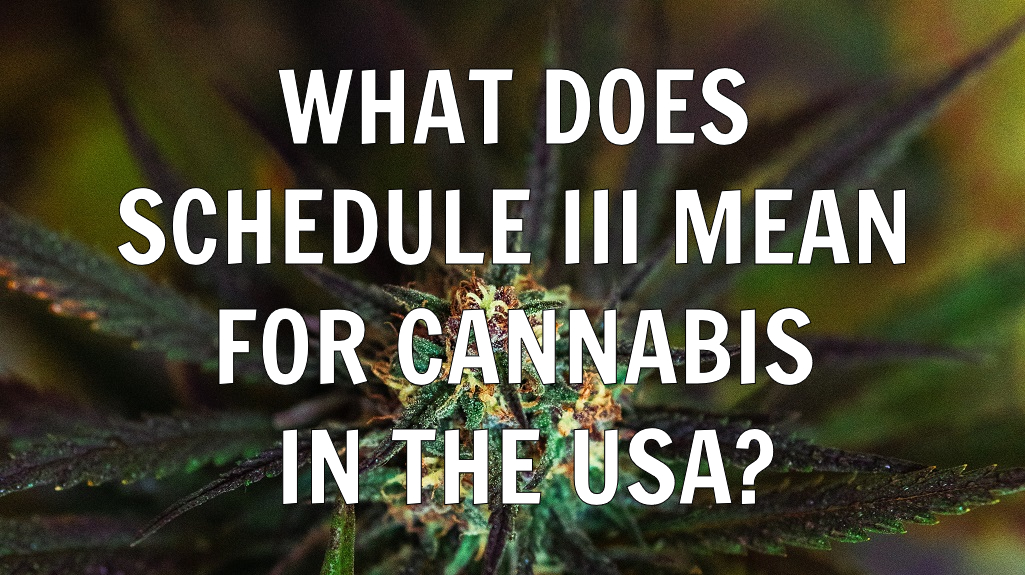Recently the United States Department of Health and Human Services (HHS) recommended that the Drug Enforcement Agency (DEA) reschedule cannabis from Schedule I to Schedule III. Such an action would have many implications for cannabis legality, research, and industry.
Schedule I and Schedule III are two different classifications under the Controlled Substances Act (CSA) in the United States. These schedules are used to categorize and regulate substances based on their potential for abuse, medical use, and safety. Here’s a brief overview of the differences between Schedule I and Schedule III substances:
Schedule I Substances:
Schedule I substances are considered the most tightly controlled under the CSA.
These substances are classified as having a high potential for abuse, no currently accepted medical use in treatment in the United States, and a lack of accepted safety for use under medical supervision.
Examples of substances classified as Schedule I include heroin, LSD (lysergic acid diethylamide), and MDMA (ecstasy).
Schedule III Substances:
Schedule III substances are less restricted compared to Schedule I substances.
These substances have a moderate to low potential for abuse relative to substances in Schedules I and II, and they have a currently accepted medical use in treatment in the United States.
Schedule III substances may lead to moderate or low physical dependence or high psychological dependence.
Examples of substances classified as Schedule III include certain narcotics like codeine combined with non-narcotic active ingredients, ketamine, and anabolic steroids.
Moving Cannabis to Schedule III
Kyle Jaeger writes in Marijuana Moment that a Schedule III classification for cannabis would open up research avenues for scientists, who would no longer have to go through the difficult process of obtaining DEA license to study the plant.
Jaeger also points out that the cannabis industry would face lower taxes, since they will be able “to make federal tax deductions that are currently prohibited for businesses involved in the sale of Schedule I or II drugs”. In a separate OpEd in Marijuana Moment, Ari Hoffnung, a cannabis industry accounting firm partner writes, “A reclassification would likely make legal cannabis products more price-competitive, shrinking the cost disparity between regulated and unregulated markets.” Hoffnung also pointed out that descheduling cannabis, or removing cannabis from the CSA, would take an act of congress that would be more difficult to achieve.
Paul Armentano, Deputy Director of the National Organization for the Reform of Marijuana Laws (NORML), disagrees. Armentano told CNN, “Any risks from cannabis are best mitigated by a policy of legalization, regulation, and education. Those risks are only compounded and exacerbated by a policy of prohibition, stigmatization, and criminalization.”
A Schedule III classification, Armentano writes, is not how the American public wants cannabis to be classified (by doctor prescription only) and that “this proposed change does little to address the widening divide between state-legal marijuana laws and federal law. Every state law that is currently in conflict with federal law today will remain in conflict with federal law going forward when or if the Administration reclassifies cannabis as a Schedule III substance.”
What About Hemp and CBD?
In 2018, the U.S. Congress passed the Agriculture Improvement Act, commonly known as the Farm Bill, which legalized the production and sale of hemp at the federal level. The law defined hemp as cannabis plants with less than 0.3% THC, the psychoactive compound found in cannabis.
While the Farm Bill legalized hemp at the federal level, it also gave individual states the authority to regulate the production, sale, and possession of hemp within their borders. As a result, hemp laws can vary from state to state. According to federal law, it is legal for to receive hemp and CBD products in the mail in all 50 states, as long as they contain less than 0.3% THC

This is amazing!
It’s about time!
This is wonderful news!
Let’s hope they do it!
Way to go! 😀
Thank you for sharing this with us!
will you cover if they do
fingers crossed it comes through for them
do we know if there have been any developments
it doesn’t seem like it but I am sure they will cover it if and when there is
It should be! There’s no reason it should be grouped with substances such as heroin or meth
Medical cannabis is already a thing over there so it makes no sense to keep it schedule 1
THIS! ^^